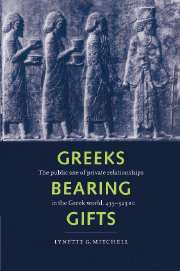Book contents
- Frontmatter
- Contents
- Preface
- Abbreviations
- 1 Philia
- 2 Philia and the polis
- 3 Philia and political activity
- 4 Magisterial appointments: Sparta
- 5 Magisterial appointments: Athens
- 6 Persia and the Greeks
- 7 Athenians and Thracians
- 8 Philip and the Greeks
- 9 Alexander
- 10 Friendship and ideology
- Appendix I Magistrates with connections
- Appendix II Notes on magistrates for the years 435–323 BC
- Bibliography
- Indexes
3 - Philia and political activity
Published online by Cambridge University Press: 06 July 2010
- Frontmatter
- Contents
- Preface
- Abbreviations
- 1 Philia
- 2 Philia and the polis
- 3 Philia and political activity
- 4 Magisterial appointments: Sparta
- 5 Magisterial appointments: Athens
- 6 Persia and the Greeks
- 7 Athenians and Thracians
- 8 Philip and the Greeks
- 9 Alexander
- 10 Friendship and ideology
- Appendix I Magistrates with connections
- Appendix II Notes on magistrates for the years 435–323 BC
- Bibliography
- Indexes
Summary
Foreign politics demand scarcely any of those qualities which a democracy possesses; and they require, on the contrary, the perfect use of almost all those faculties in which it is deficient. Democracy … cannot combine its measures with secrecy, and it will not await their consequences with patience. These are qualities which more especially belong to an individual or an aristocracy.
Alexis de Tocqueville, Democracy in AmericaAristotle wrote that the polis is a koinonia (association) which aims at achieving the common good. Implicit in this is the belief that citizenship, or membership of the polis, is participatory and that it is the duty of the good citizen to take his part in seeking the common benefit and security of the state. But what was best for the state could be variously interpreted and was a point on which citizens could disagree. Public policy – and the popular perception of the common good – could change swiftly and erratically according to the fortunes of the political leaders and their political groups.
The common concern to achieve what is best for the state, Aristotle argues, is grounded in philia, ‘for philia is the motive for social life’, and political relationships were embedded within social relationships. Not only were philia relationships based on utility naturally suited to political contexts, but other more personal relationships, such as kinship and comradeship, could also become politicised.
- Type
- Chapter
- Information
- Greeks Bearing GiftsThe Public Use of Private Relationships in the Greek World, 435–323 BC, pp. 41 - 72Publisher: Cambridge University PressPrint publication year: 1998



